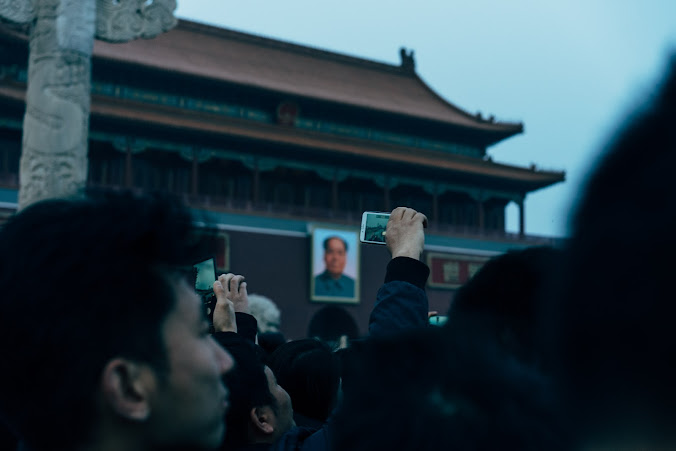It has been 30 years since the Chinese government cracked down on protesters in Tiananmen Square. Therefore, it would be appropriate to look at the role of the Chinese government today.
 |
| Photo (https://unsplash.com/photos/vx4whWP8SPU) |
The year 2019 is important for China in many ways. This year marks the anniversary of many important events in China. However, the anniversary of an incident is not acceptable to Beijing, which is the agitation in Tiananmen Square. This year marks the 30th anniversary of this event. On June 3 and 4, 1989, hundreds of students, workers, and journalists took to the streets to protest against the growing corruption in China and the need for more democratic governance. Understanding that the movement was a challenge to the stable functioning of the government, Deng Xiaoping, the leader of the Chinese Communist Party, silenced the protesters, who took to the streets using martial law with the help of the People's Liberation Army. Even today, the exact number of people killed during the agitation is not known. How many people died in it is still a mystery. The Chinese Communist Party (CCP) brutally suppressed the movement because it saw it as a threat to its credibility and legitimacy. Since then the CCP has always been vigilant in reducing and preventing large-scale mass protests.
While no one publicly acknowledges that the student movement has had a major impact on the CCP's ideology and policies, no one is openly denying it. The Chinese government's mouthpiece, the Global Times, published an article on June 4 entitled "Thirty Years Later." In which he claims that the confidence of the youth about the future of the country has increased. Although the title suggests that the article was written in the context of the Tiananmen Square incident, the main purpose of the article is to show that young people in China now have more faith in the CCP and are more loyal to the party. The Chinese government, led by Xi Jinping, wants to maintain peace and stability in China at all costs.
It is well known that censorship intensified in China even 30 years after the incident. Issues 4 and 6, June and Tiananmen have been reported to be censored by the government if anyone searches the internet. The same method has been used in 2019 as well. In China, this anniversary is commonly known as "Internet Maintenance Day" because many Internet sites are closed on this day.
However, artificial intelligence and other surveillance technologies have helped the government tighten controls. In 2019, the controls will not be limited to China, but the Twitter accounts of 100 important thinkers and activists from around the world will be shut down. As a result, the current young generation in China has no clear idea about this phenomenon.
The statement from US Secretary of State Mike Pompeo on the incident was met with a similar response from the Chinese embassy in the United States. Recalling the incident and paying tribute to the protesters, Pompeo said, "Those who bravely raised their voices in Tiananmen Square thirty years ago are the real heroes of the Chinese masses." The Department of Foreign Ministry, China broadcast a statement condemning to Popmeo's verdict. The statement mainly argued that China's enemies would never succeed in their actions and that they would always "hate China's political policy, defame China's human rights and religious practices, defame China's Xinjiang policy and repeatedly interfere in China's local affairs." Are in such an endeavor. Even today, the role of the Chinese government is that this action was necessary and appropriate. It is widely believed that the West and the outside world have a hand in spreading unrest in China. Pompeo's remarks were prompted by the ongoing trade war between China and the United States to oppose China's rise to the world stage and its rightful place in the world rankings.
In contrast, Hong Kong celebrates this anniversary every year. Activists had organized a candlelight vigil with 180,000 people. Many of these protesters are currently in jail or serving deportation sentences. One evening in Tiananmen Square on June 4, 2011, the police were on high alert and their presence in plain clothes was not to be overlooked. The government is always trying to make June 3 and 4 the same as any other normal day of the year.
Thirty years after the Tiananmen Square incident, the Chinese government still does not believe in allowing Chinese citizens to have an open discussion and accept responsibility for their actions. He is trying his best to prevent this history from happening to the present generation. Following the 1989 incident at Tiananmen Square, the government has launched a campaign to teach collective patriotism, informing and inculcating only "official history" among the people.
He has not reserved a single place where the government statement will be ridiculed. Authorities fear a repeat of the Tiananmen Square incident, and are wary of such a reaction. One can claim that the Chinese government has adopted a decent way of controlling and monitoring. Xi has also curtailed all forms of freedom and space for civil society. Sanctions on the press and media have also been kept in check and under strict control. Demonstrations of any kind are subject to strict sanction and control. He has also announced an anti-corruption campaign to brighten the party's image.
However, the question arises as to whether the CCP will resort to the same approach again if such a crisis arises again. How successful will they be in banning the dissemination of information in the age of the Internet and messaging technology? And will this party win again?

Post a Comment